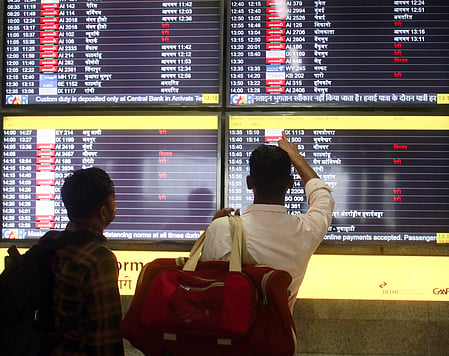Flight disruptions to blame? UAE travellers rush to sign up for travel insurance
Days of cancelled flights prompts UAE travellers to focus more sharply on trip protection

Dubai: Travel disruptions hit hard this week after the Ethiopia volcano sent ash sweeping into major air corridors between the Gulf and India. Airlines cancelled and rerouted flights without warning, leaving many travellers scrambling for new plans and covering unexpected costs along the way.
Moments like these are pushing more UAE residents to protect their travel plans before stepping on a plane. Policybazaar.ae reports a 45% jump in travel-insurance queries for Q4 2025 compared with last year.
That increase particularly comes at a time when more people travel for National Day, year-end holidays and the December school break — a period when disruptions are more painful and costly.
Lock in insurance early
Travellers are locking in insurance earlier, paying closer attention to cancellation and delay clauses, and choosing coverage that mirrors the rising uncertainty. Inbound travellers are doing the same, with a 48% rise in visitors securing insurance for trips into the UAE.
Toshita Chauhan, Chief Business Officer – General Insurance at Policybazaar.ae, says demand reflects a more aware and proactive traveller: “Travellers today are far more aware of the risks associated with international travel and view insurance as a necessity.
"We are seeing a clear shift toward informed decision-making, with customers actively seeking protection, especially during peak travel periods when volumes are at their highest.”
Why buy insurance now
The strongest interest comes from travellers aged 28–45, a group that often books tightly scheduled itineraries, relies heavily on pre-paid arrangements and values financial protection.
People are also insuring more diverse trips. Nature-driven holidays, hiking, wildlife travel and remote itineraries are trending. Solo travellers — including more women travelling independently — are choosing comprehensive policies that cover medical emergencies, trip interruptions and lost belongings.
Safety net — not gamble
Recent data shows many travellers are acting on that instinct. A 2025 survey found a 32% rise in travel-insurance quote requests between January and April compared with the same period in 2024, according to a Reuters poll.
That jump mirrors the wave of uncertainty passengers have felt during recent disruptions. Insurers say interest consistently spikes after major events — whether an IT outage or a natural incident — with some reporting a noticeable surge in requests for “delay coverage” right after a global disruption.
Market estimates reinforce the shift: the global travel-insurance sector is valued at about $30.77 billion in 2025 and is forecast to grow at roughly 16.8% through 2029. For everyday travellers, it signals something simple — people aren’t willing to fly without financial protection anymore.
What coverage works
Today’s travellers prioritise coverage that shields them from the most expensive risks:
Trip-cancellation or interruption protection for events like volcanic ash, severe weather, strikes or unexpected crises.
Flight-delay benefits that cover meals, hotels or alternative transport when delays stretch for hours.
Medical and emergency assistance for costly treatment or evacuation abroad.
Cancel-for-Any-Reason (CFAR) policies for added flexibility.
TravelInsurance.com summarises the shift in their 2025 outlook: “Travel insurance today is more important to travelers than ever before. Disruptions persist, from unpredictable weather events to flight disruptions and health issues.
"Trip cancellation coverage protects trip costs, while travel medical and emergency coverage is essential for those venturing abroad.” For travellers, that means fewer surprise expenses and less risk of losing money on non-refundable bookings.
Impact on UAE travellers
Travellers departing from Dubai, Abu Dhabi or Sharjah during winter and year-end holidays face heavy booking volumes — and higher disruption risk. When plans shift unexpectedly, you may end up:
Paying more for last-minute flights
Covering hotel nights during extended delays
Losing non-refundable tours or stays
Rearranging onward connections at your own expense
The past week showed how fast carefully planned itineraries can collapse. In that environment, travel insurance feels less like an optional extra and more like a financial buffer.
If you’re flying soon, compare policies carefully. Check cancellation and delay protections. Look for coverage that includes natural-event disruptions such as volcanic ash. Review medical limits. Consider CFAR coverage if your plans feel uncertain.
A policy won’t stop disruptions — but it determines who pays for them: you, or your insurer.
Sign up for the Daily Briefing
Get the latest news and updates straight to your inbox
Network Links
GN StoreDownload our app
© Al Nisr Publishing LLC 2026. All rights reserved.
